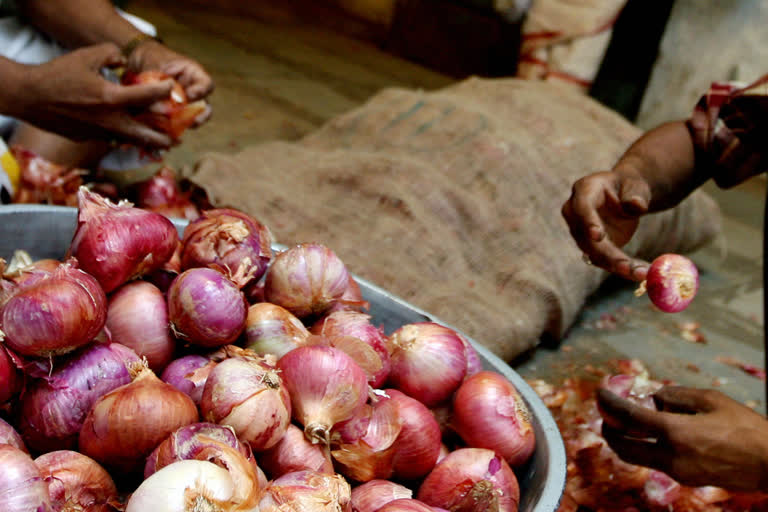Hyderabad, Chennai, New Delhi: Onion prices this season have scaled a new high as they touched the 'Rs 100/kg' mark in retail markets across the country.
The skyrocketing prices were reported from Chennai, Delhi, Bhopal, Bhubaneswar, Jalandhar and several other cities, bringing in the proverbial 'onion' tears to the common man.
As per the official data, the prices, which initially was pegged at Rs 55/kg on October 1, rose by 45 per cent. Subsequently, the rates hovered around Rs 80/kg, in the last one week, despite the central government's measures to boost supply and contain the price rise.
Factors responsible for the price rise
Sometimes climate plays a major role in deciding the prices of the essential commodities like onions. Due to untimely rains in Nashik, western parts of Karnataka, Andhra Pradesh as well as other major onion producing regions, there was a huge loss of the crop, which leads to a shortage of onions in the market.
So, can we conclude the recent flash floods are the culprit? No.
Experts say that more than the climate-related facts, it is the middlemen to blame.
Dr Alli P, Senior Assistant Professor at VIT Vellore said: "our research that tracked the entire onion supply chain in the country concluded that the prices of onion have been fluctuating from 1998 onwards, not just due to the demand-supply constraints, but due to the dominance of middlemen."
She further said the arrival of onions in the markets has nothing to do with the price rise. While the farmers, who are the main producers, get only Rs 5-10 per kg, profits go into the pockets of retailers and wholesalers.
These wholesalers act as middlemen and during the peak season, store large quantities of onion in large scale containers and release these during the offseason when the production is less. This artificially inflates the cost, leading to an increase in onion prices, she concluded.
Government's steps to curb price rise
The government is expediting supply from imports with over 5,500 tonnes of onion are to hit the retail markets shortly.
Of this, 2,500 tonnes have already reached the Indian ports in 80 containers of which 70 are from Egypt and 10 from the Netherlands. Another 3,000 tonnes are to come from 100 containers Agriculture Ministry sources said.
Speaking To ETV Bharat Union Consumer Affairs Minister Ram Vilas Paswan said that the government is taking steps to lower prices by creating a buffer stock of 56,700 tonnes of onion out of which 1,525 tonnes are available with NAFED at present.
The government also banned the export of onions so as to retain stock for domestic consumption. Stock holding limit of 10 tonnes for retailers and 50 tonnes for wholesalers is under implementation at present.
What is the solution?
Lasalgaon, which is Asia's largest wholesale market for onions, saw a price reduction of Rs 1500 per quintal in the recent week. While dry onions were sold at Rs 4400 per quintal and the red onions at Rs 2500 per quintal.
Likely high supplies in the wholesale markets to ease retail prices in coming days, there is a need to find out long term solutions.
As per Dr Alli P, there is a need to implement the market intervention scheme, which should be carried out if the prices of the essential commodities fall in the open market. And farmers should directly sell their produce to the consumers without the intervention of any middlemen.
Read more: From next January NEFT to be free of charges



